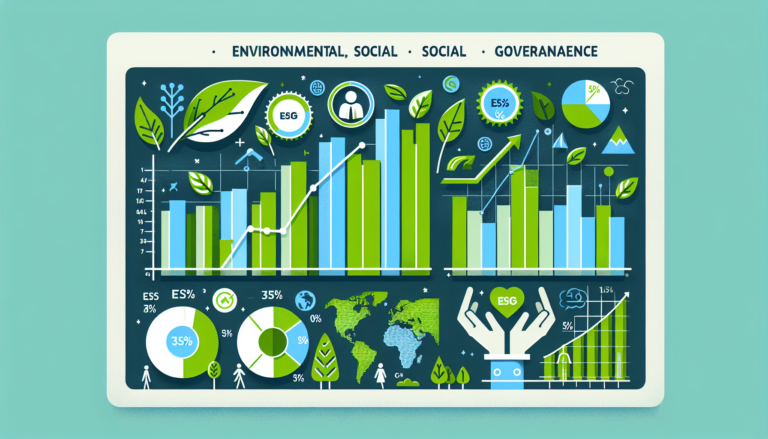Explore top-rated fidelity ESG investment funds
Best fidelity ESG funds offer sustainable investment options that align with personal values while providing potential for strong financial returns and reduced risk through responsible corporate practices.
Best fidelity ESG funds are gaining popularity as investors seek sustainable investment opportunities. But what makes them stand out, and how do they impact your portfolio?
Understanding ESG investment criteria
Understanding ESG investment criteria is essential for making informed investment decisions. ESG stands for Environmental, Social, and Governance, which are the three central factors in measuring the sustainability and societal impact of an investment.
Environmental Criteria
The environmental aspect evaluates how a company performs as a steward of nature. This includes factors like climate change policies, carbon emissions, waste management, and natural resource conservation. Investors look for companies that minimize their negative impact on the environment.
Social Criteria
The social component examines how a company manages relationships with its stakeholders. This covers employee treatment, community engagement, and customer satisfaction. Investors often favor companies that prioritize ethical practices and actively contribute to the well-being of society.
Governance Criteria
Governance involves a company’s leadership, executive pay, audits, internal controls, and shareholder rights. It is important for investors to choose companies with transparent and ethical governance practices to ensure their long-term sustainability.
By analyzing these ESG criteria, investors aim to identify companies that not only seek profit but also contribute positively to society and the environment. This holistic approach is redefining investment strategies and aligning them with personal values.
Top fidelity ESG funds for performance
When looking for top fidelity ESG funds that deliver strong performance, it’s essential to analyze their historical track records, portfolio compositions, and management strategies. These funds not only focus on financial returns but also align with sustainable investing principles.
Criteria for Selecting Funds
Investing in ESG funds requires evaluating several factors. Look for funds that consistently outperform their benchmarks in both returns and ESG ratings. This involves examining their investment philosophy and how actively they integrate ESG criteria in their decision-making process.
Notable Fidelity ESG Funds
Several Fidelity ESG funds have gained recognition for their solid performance. The Fidelity U.S. Sustainability Index Fund and Fidelity Sustainable High Yield Fund are two examples that consistently show promising results. These funds invest in companies that not only exhibit strong financial health but also adhere to sustainable practices.
Performance Metrics
Performance could vary based on market conditions, but analyzing metrics like alpha, beta, and Sharpe ratios can provide valuable insights. Investors should consider how these metrics reflect the fund’s ability to deliver excess returns over time, relative to its risk.
Diversification Benefits
Investing in a range of fidelity ESG funds can offer significant diversification benefits. By spreading investments across various sectors that emphasize sustainability, investors can mitigate risks while potentially enhancing returns. This diversification is crucial in today’s changing economic climate.
Choosing the right fidelity ESG funds involves a careful assessment of their objectives, performance history, and how well they align with one’s investment goals. The commitment to sustainable investing is not just beneficial for the planet but can also prove lucrative.
How to evaluate ESG fund ratings
Evaluating ESG fund ratings is crucial for investors who want to ensure their investments align with sustainability goals. ESG ratings assess how well a fund incorporates environmental, social, and governance factors into its investment decisions.
Understanding the Rating Systems
Different agencies use various methodologies to evaluate ESG performance. Some agencies may focus more on environmental metrics, while others might emphasize social or governance factors. Familiarize yourself with these rating systems to better understand the scores assigned to each fund.
Key Factors to Consider
When evaluating ESG fund ratings, look at factors such as transparency, consistency, and the agency’s credibility. Transparent funds should provide clear information about their ESG practices and the metrics they use for evaluation. Consistency in how they apply these metrics over time is also important.
Comparing ESG Ratings
It can be helpful to compare ESG ratings from multiple agencies. This way, you can get a more comprehensive view of a fund’s overall performance. Look for trends or discrepancies in ratings and investigate the reasons behind them.
Impact on Financial Performance
Research suggests that strong ESG performance can lead to better long-term financial returns. Analyze how a fund’s ESG rating correlates with its financial performance. Understanding this relationship can help you make more informed investment choices.
Finally, always consider your investment goals and values when evaluating ESG funds. A fund may have an excellent ESG rating, but it should also align with your personal values and financial objectives.
Benefits of investing in fidelity ESG funds
Investing in fidelity ESG funds provides several benefits that appeal to environmentally and socially conscious investors. These funds not only focus on financial returns but also promote positive changes in society and the environment.
Alignment with Personal Values
One of the primary benefits is the alignment of investments with personal values. By choosing ESG funds, investors can support companies that prioritize sustainability and ethical practices. This gives investors a sense of purpose, knowing their money is contributing to positive outcomes.
Potential for Strong Financial Returns
Research shows that companies with strong ESG practices often outperform their peers in the long run. Investing in fidelity ESG funds can therefore provide competitive financial returns. Many funds demonstrate resilience during market downturns due to their focus on sustainable business models.
Risk Management
Funds that adhere to ESG criteria often exhibit better risk management. By avoiding companies engaged in harmful practices, these funds reduce exposure to regulatory fines, reputational damage, and other financial risks. This prudent approach can protect investors’ capital over time.
Diverse Investment Opportunities
Fidelity ESG funds generally offer a diverse range of investment options. Investors can gain exposure to various sectors such as technology, renewable energy, and healthcare, all while supporting responsible businesses. This diversification can help enhance the overall stability of a portfolio.
In addition, investing in ESG funds can open doors to innovative companies that prioritize sustainability. These companies are often at the forefront of technological advancements, which can lead to attractive investment opportunities.
Comparative analysis of fidelity ESG options
A comparative analysis of fidelity ESG options can help investors identify the best funds for their portfolios. By examining various factors like performance, risk, and investment strategy, investors can make informed choices that align with their values and financial goals.
Performance Comparison
Review the performance metrics of different fidelity ESG funds over various time periods. Look for funds that consistently outperform their benchmarks. Key metrics to consider include total returns, volatility, and risk-adjusted returns.
Fees and Expenses
Understanding the fee structure of each fund is vital. Lower expense ratios can lead to higher net returns for investors over time. Compare various fees such as management fees, administrative fees, and any sales charges. A fund with a slightly lower performance but significantly lower fees may provide better overall value.
Investment Strategy
Dive into the investment strategies employed by different fidelity ESG funds. Some funds may focus on large-cap stocks, while others may invest in smaller companies or specific sectors like renewable energy. Knowing the strategy helps match the fund’s objectives with your investment philosophy.
Risk Assessment
Assessing the risks associated with each fund is crucial. Evaluate how each fund performed during market downturns and economic challenges. Consider factors like standard deviation and beta to understand each fund’s risk exposure compared to broader market indices.
By conducting a thorough comparative analysis of fidelity ESG options, investors can make more strategic choices that align with their investment objectives while supporting sustainable and ethical practices.
Future trends in ESG investing
The future of ESG investing is bright, with several trends shaping how investors approach sustainable investment. As awareness of environmental and social issues grows, these trends may influence how funds are structured and how investments are made.
Increased Regulatory Pressure
Regulatory frameworks surrounding ESG investing are becoming more robust. Governments around the world are implementing regulations that require companies to disclose their ESG practices. This transparency will help investors make better-informed decisions and promote responsible corporate behavior.
Technological Advancements
Emerging technologies are enhancing data collection and analysis for ESG factors. Tools like artificial intelligence and big data analytics allow investors to obtain deeper insights into how companies perform against ESG benchmarks. This technology will improve the ability to assess risks and opportunities effectively.
Shift Toward Impact Investing
Investors are increasingly looking for ways to make a measurable impact through their investments. Impact investing, which focuses on generating positive social or environmental effects alongside financial returns, is likely to gain more traction. Funds that emphasize this approach will become more popular among millennials and younger investors.
Focus on Renewable Energy and Sustainability
As the world moves towards cleaner energy, ESG investments will likely gravitate toward businesses that promote renewable energy and sustainability. Companies involved in solar, wind, and other renewable sources are expected to attract more capital as investors seek to support environmentally responsible initiatives.
Social factors will also gain importance, with investors focusing on companies that prioritize diversity, equity, and inclusion. Those that fail to meet these expectations may face backlash from investors and consumers.
The Future of Investing in Fidelity ESG Funds
Investing in fidelity ESG funds offers a unique opportunity to support sustainable practices while aiming for solid financial returns. As the trends in ESG investing evolve, investors can expect to see more focus on transparency, innovative technologies, and impactful investment strategies.
By aligning investments with personal values, individuals can contribute to positive change in society and the environment. As awareness grows and regulations strengthen, the integrity and appeal of ESG funds will continue to rise.
In conclusion, the future of ESG investing looks promising. Investors should stay informed and consider the trends shaping the industry to make the best investment choices.
Frequently Asked Questions
What are fidelity ESG funds?
Fidelity ESG funds are investment funds that focus on companies meeting environmental, social, and governance criteria while also aiming to provide competitive financial returns.
Why should I consider ESG investing?
ESG investing allows you to align your investments with your personal values, supporting businesses that prioritize sustainability and ethical practices.
How do I evaluate ESG fund ratings?
You can evaluate ESG fund ratings by examining the methodologies of different rating agencies, comparing ratings from multiple sources, and looking at performance metrics.
What are the benefits of investing in ESG funds?
Benefits of investing in ESG funds include alignment with personal values, potential for strong financial returns, better risk management, and exposure to innovative companies.
What future trends are impacting ESG investing?
Future trends include increased regulatory pressure, advancements in technology for data analysis, a shift towards impact investing, and a focus on renewable energy and sustainability.
How can I start investing in fidelity ESG funds?
You can start by researching different fidelity ESG funds, evaluating their objectives, performance, and fee structures, and speaking with a financial advisor if needed.






